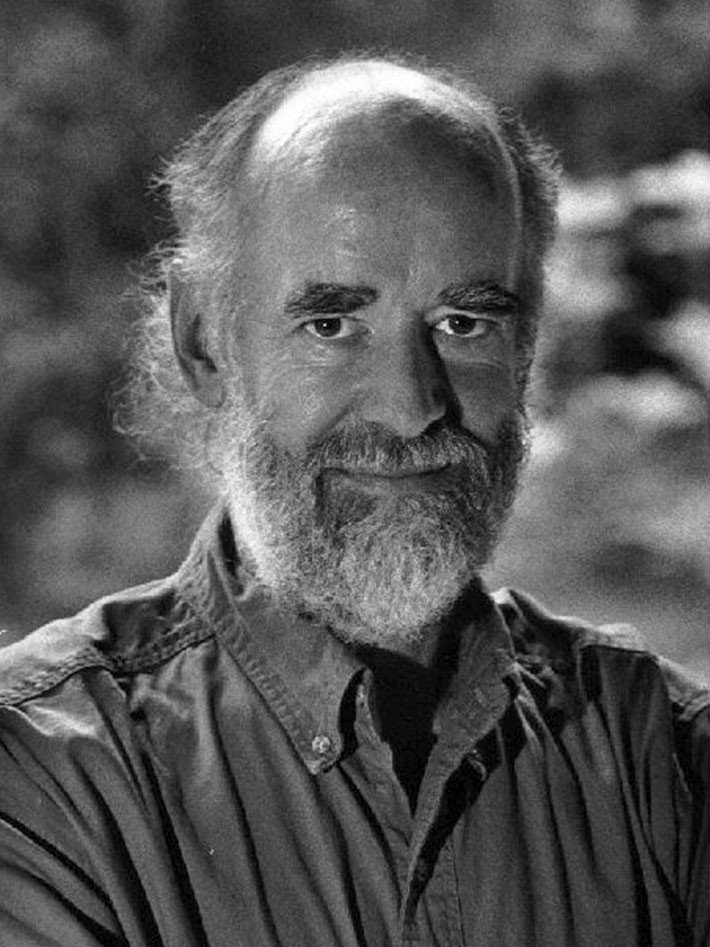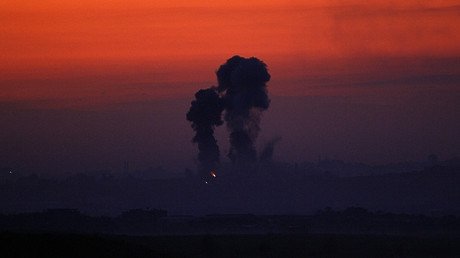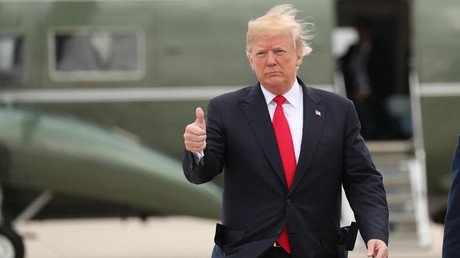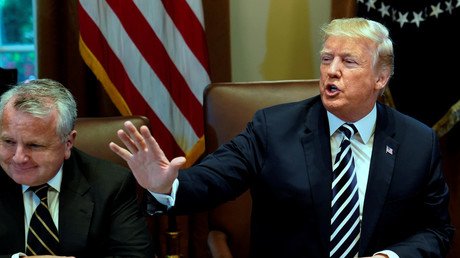'Wicked sense of humor': Could Donald Trump be a Nobel Peace Prize laureate?
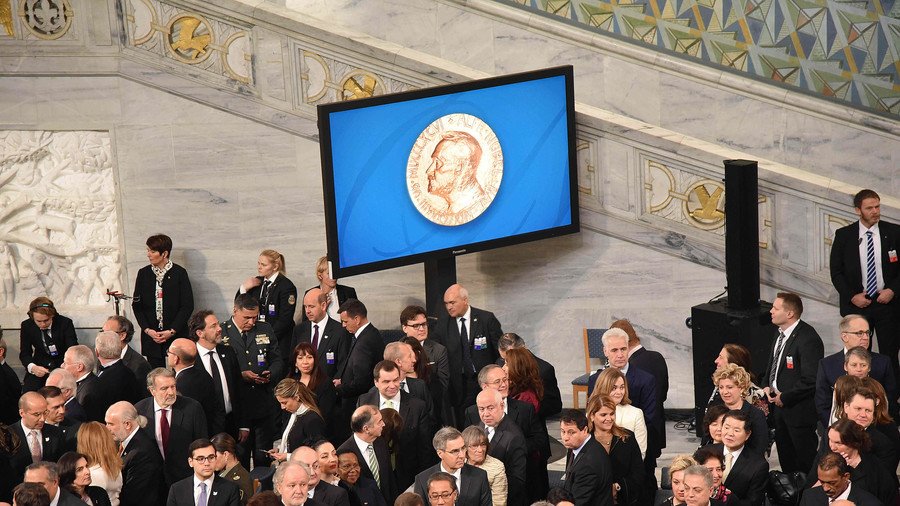
Republicans in Congress, and a pair of Norwegian parliamentarians seek to further tarnish Nobel's peace prize by nominating Trump. 'President Donald Trump receives a Nobel Peace Prize!' - I suppose it could happen.
Trump after all was already nominated by his Republican Party in Congress, who, a bit prematurely, sent a letter to the Nobel Committee back in mid-May before it was even certain that his summit meeting with North Korean leader Kim Jong-un would happen. Earlier this month following that summit in Singapore, two enthusiastic conservative members of the ruling Progress Party in Norway's parliament added their own nomination.
Parliamentarians Christian Tybring-Gjedde and Per-Willy Amundsen, who share Trump's anti-immigrant and low-tax predilections, acknowledged in their nomination letter that it's too early to claim Trump has succeeded in denuclearizing North Korea and ending the 68-year-old Korean War, but they argue that thanks to that summit, "A process is underway to ensure world peace in the future. It's a fragile process but we must of course do what we can to help this process bring good results."
Critics might object to the idea of awarding the world's most coveted prize, won previously by the likes of Martin Luther King, Jr., Nelson Mandela, Malala Yousafzai, all of whom put their lives on the line to promote peace or human rights, to Donald Trump.
But then again, the Nobel Peace Prize has over the years celebrated some rather dubious nominees, with a surprising number of those controversial winners being Americans.
Take the 1973 decision to award the prize jointly to US Secretary of State Henry Kissinger and North Vietnamese foreign minister Le Duc Tho. The latter became the first and only Nobel laureate to decline the prize, saying that by the time it was announced the US was already violating the terms of a truce in Vietnam by continuing to arm and support the Army of South Vietnam, which fought on until April 1975 when Viet Cong and North Vietnamese forces finally over-ran Saigon and ended the war.
Kissinger, as President Nixon's chief strategist in that long-running and genocidal American war, orchestrated the so-called Christmas Bombing of North Vietnam, sending waves of giant B-52 bombers to carpet bomb Hanoi and Haiphong. The weeks-long blitz included destroying dykes, power plants, hospitals and schools in what was widely recognized as a horrific war crime. No matter, Kissinger accepted his peace prize. While he still has to guard against arrest when he travels abroad, he proudly shares his award with Dr. King, Mandela and Yousafzai.
And then there's the 2009 award of the Nobel Prize to the newly-elected President Barack Obama, a man whose achievements in the realm of foreign policy were at the time of his nomination nonexistent. In retrospect, a former secretary of the Nobel Committee said that it was more aspirational than an award for performance.
Hard-pressed to find anything concrete that the new president had done to deserve the award, the committee in announcing its decision argued: "Only very rarely has a person to the same extent as Obama captured the world's attention and given its people hope for a better future."
Sadly Obama went on to send more troops to Afghanistan, continuing that already long war through his two terms of office and handing it off eight years later to his successor, Donald Trump. Obama also continued US involvement in the conflict in war-ravaged Iraq, sent Pentagon and CIA personnel to train and arm ISIS and Al Nusra rebels in Syria, where he also threatened a massive cruise missile assault on the Syrian government and military, expanded the US drone war against five other nations including Pakistan and Somalia, and perhaps most ironically, began a $1-trillion modernization and upgrade of the US nuclear weapons stockpile. In the end his only concrete step towards peace and use of diplomacy as president was the multi-national agreement with Iran to shut down that country's nuclear fuel processing program and commit it to not working to develop a nuclear weapon.
Looking at these controversial Nobel awards, Trump's nomination doesn't seem that out of place. Indeed, a disproportionate number of Nobel Peace Prizes have gone to US presidents and other top government officials most of whom have considerable blood on their hands and even arguably war criminal activities on their records.
Take Teddy Roosevelt, a 1906 winner on the merits of his mediation of the Russo-Japanese War, who as president ordered and oversaw the brutal crushing by the US Marines of a Philippines independence insurrection. US troops slaughtered hundreds of thousands of Filipino independence fighters as well as untold numbers of women and children in that war.
Then there's Roosevelt's Secretary of War, Elihu Root, who won his Nobel in 1912, despite having been War Secretary during the criminal US suppression of the Philippines independence struggle.
Next there's President Woodrow Wilson, who won his Nobel for his role in establishing the League of Nations, predecessor to the United Nations. Ignored by the Nobel Committee was the reality that Wilson was an incorrigible racist who as president launched a criminal invasion of Mexico, and who then lied the US into the pointless and epically bloody First World War, later using that war as a pretext to crush the increasingly popular and anti-war Socialist Party in the US.
President Jimmy Carter received his Nobel Peace Prize in 2002, awarded for his post-presidential work promoting peace and democratic elections around the world. Forgotten was his support as president for the suppression of independence and democracy movements: in Indonesia, where the US supplied arms to the country while its military was slaughtering hundreds of thousands of independence supporters on the island of Timor; in South Korea - where Carter's Pentagon gave the go-ahead for the South Korean army's slaughter of hundreds of students and workers in the 1980 Gwangju uprising against military dictator Chun Doo-hwan, and in Afghanistan, where the US armed and trained Mujahedeen rebels against that then communist and Soviet-backed government, creating the forces that later morphed into the Taliban and Al Qaeda.
Given this history of the award, Trump, who has his own war crimes history after only 18 months in office, including two criminal missile attacks on Syrian government and military installations, support for Saudi Arabia's genocidal war on Yemen, an expanded campaign of drone killings around the world which have killed countless civilians, the illegal occupation of portions of Syria, and making threats to incinerate North Korea, could still apparently qualify for a Nobel Prize.
As University of Illinois International Law Professor Francis Boyle, who drafted the US implementing legislation for the UN Biological Weapons Convention, signed into law by President George H.W. Bush, said, "For someone of my Woodstock generation, the so-called Nobel Peace Prize will always be the Kissinger War Prize for Vietnam. Obama got one of those too. And now Norwegian parliamentarians are nominating Trump for the Kissinger/Obama War Prize. Those Norwegians sure have a wicked sense of humor."
Is it possible Trump could get the prize and at least tie with his bête noire ex-President Obama? Perhaps, in the unlikely event that he can get Kim to actually agree to trade in all his nukes for economic aid and a multi-lateral agreement ensuring his country against a "regime-change" attack. Even then it would help if the nomination came from South Korean President Moon Jae-in (who has said he would be willing to do so).
Still, the unpredictable and mercurial Trump seems hell-bent on sabotaging his chances. His trade war moves are the antithesis of diplomacy, pulling the US out of the UN Human Rights Council has outraged most of the world's leaders, and his brutal immigration policy of separating children and even nursing babies from their asylum-seeking parents has shocked the entire world. (Earlier this month, under pressure from his own party in Congress, Trump issued an executive order cancelling the separation policy, but the administration's "zero-tolerance"policy on immigrants remains and thousands of immigrant kids are still separated from their parents and being held in cages.)
Already, at least one member of the Nobel Committee has decried Trump's immigration policy, saying the US president is "no longer the moral leader of his country or of the world."
Still, there would be a precedent for awarding the Nobel Prize to a militarist, women's crotch-grabbing, white-supremacist advocating TV reality showman. As the US writer Mark Twain (Samuel Clemens) wrote in 1909 on the inauguration day of President Howard Taft, which marked the end of Nobel Laureate Teddy Roosevelt's second term as President: "Our people have adored this showy charlatan as perhaps no impostor of his brood has been adored since the Golden Calf; so it is to be expected that the nation will want him back again after he is done hunting other wild animals heroically in Africa, with the safeguards and advertising equipment of a park of artillery and a brass band."
Like this story? Share it with a friend!
The statements, views and opinions expressed in this column are solely those of the author and do not necessarily represent those of RT.
